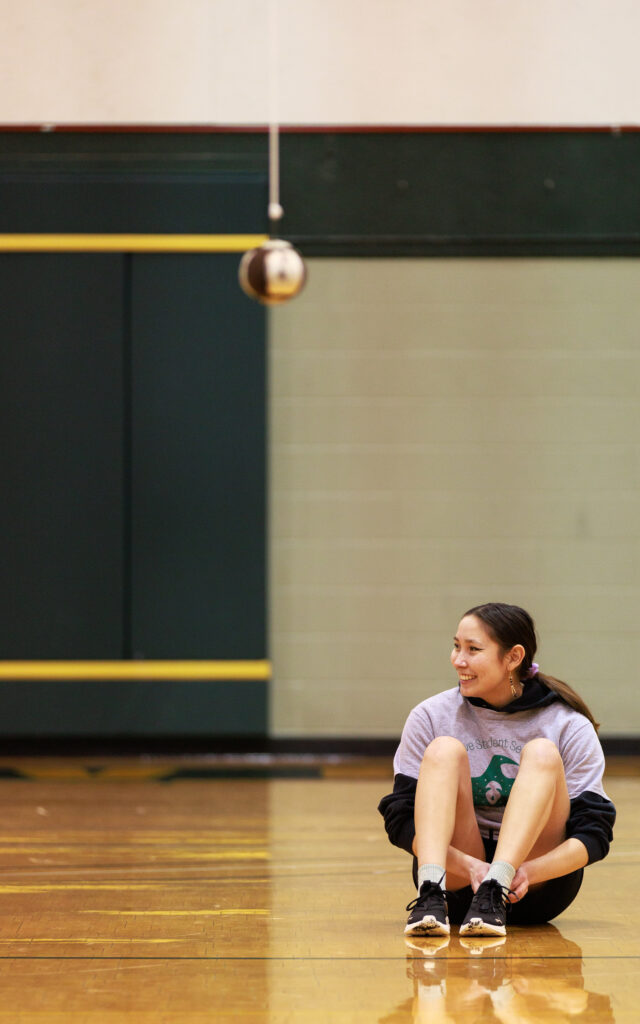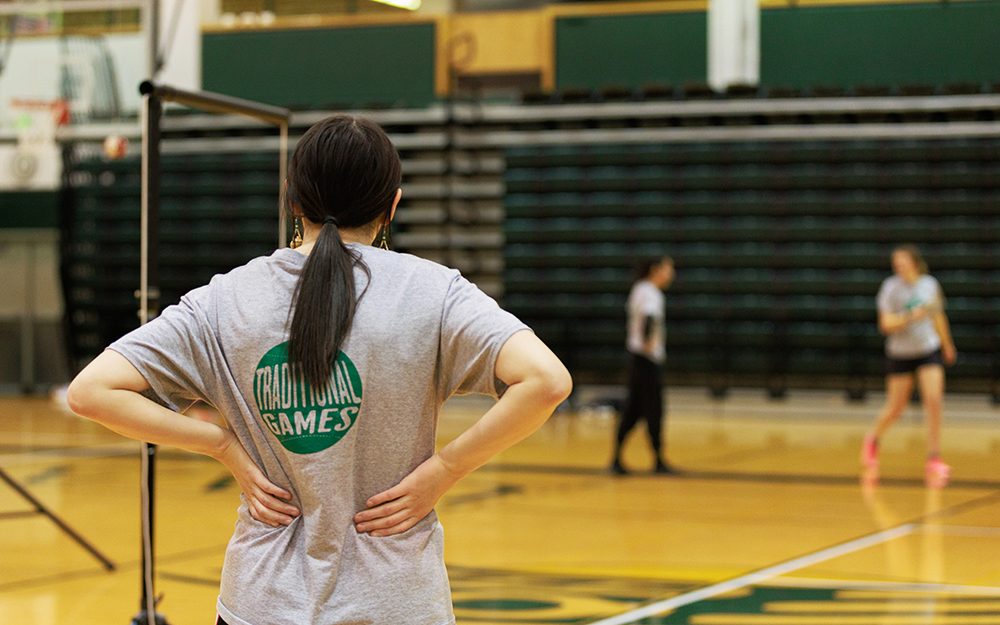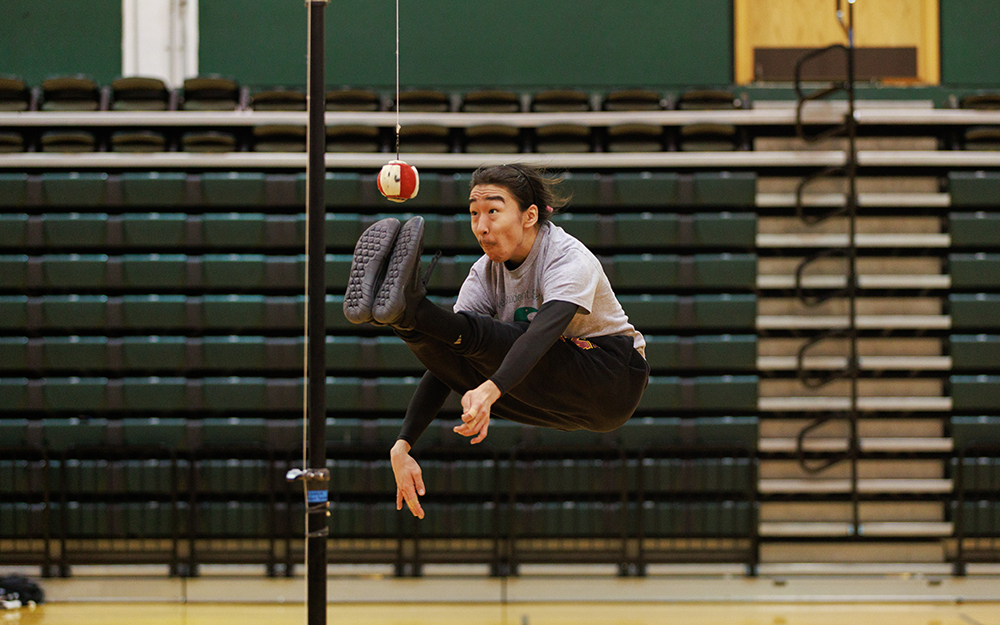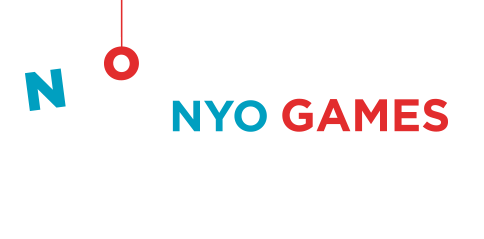28 Mar Traditional Games Clubs Keep Athletes Involved
Athletes find opportunities to stay connected to their sport after aging out of NYO Games
Cheers echo across the Avis Sports Complex gym as Temyka Ayuluk pulls ahead of her teammates in the Seal Hop. The other athletes whoop and shout as Temyka hops until her arms give out.
Jade Wren dashes over, hands up to high-five Temyka, a big grin on her face.
“Everybody on this team—even anybody who does NYO—is just one big family,” reflected Jade.
“I Just Want to Keep Doing the Games”

A freshman at the University of Alaska Anchorage (UAA), Jade is the president of the newly formed UAA Traditional Games Club. While past UAA students have brought traditional Alaska Native games to the university before, Jade was determined to create an official, school-sanctioned club, which would make the group eligible for funding.
It was important, she said, to know wherever she went to school, she would be able to stay involved in traditional games like the ones she had learned and practiced as part of Native Youth Olympic (NYO) Games. Going to NYO events played a big role in helping her get over her shyness and make friends as an elementary school student; as a high schooler, she was inspired by the adults who volunteered as officials and coaches.
“[NYO] is really kind of my life, and I don’t want it to go away,” Jade shared. “Everybody in the NYO Games are like my second family. It’s just home.”
Inspired by her prior experience in the Games, Jade reached out to UAA Native Student Services to help her through the process of organizing the new club. Now, every Tuesday and Thursday, a small group of students meet to practice events like the Seal Hop and the Two-Foot High Kick, to help each other improve their technique, and to cheer each other on.
Any UAA student can join the Traditional Games Club’s open practices, regardless of whether they’ve been involved with NYO previously.
“I just want to make sure that everybody knows about it […] and can be involved,” Jade said. “I just want to keep doing the Games.”
Having Fun and Staying Connected
On a brisk Friday in March, Jade joined a dozen other athletes across town, in the Athabascan Ceremonial House behind the Alaska Native Heritage Center (ANHC). The center’s NYO practices are open to all competition-aged athletes, from first grade into adulthood. That night, most of the athletes at practice were high school- and college-aged.
This winter is the first time ANHC has opened the practice group to anyone in the community—and it’s regularly attracting up to 25 athletes who either want to stay involved in traditional games or learn about them for the first time.
“We have these just incredible athletes who are getting older, but now because they’re getting older, we’re seeing a way to introduce them into more competition,” remarked Peter Pilak Griggs, who runs the NYO practices at ANHC.
Peter, who was introduced to the games as a student at the Alaska Native Cultural Charter School, uses his experience coaching others at Senior NYO Games to provide advice about form and technique to the athletes at practice.
Laughter filled the Ceremonial House as athletes debated whether the sealskin ball they were using to practice the Two-Foot High Kick was hanging at 94 or 95 inches.
“This is a space where people don’t have to be the best,” Peter explained. “We’re all just having fun kicking. We’re not necessarily all going for PRs; we’re just kicking to get our form better. Something like this, I feel, opens up to not just the high schoolers and the middle schoolers, but the adults.”

Opportunities for Older Athletes
ANHC is a long-established program, and for quite a while, it was one of only a handful of venues where young adults who had aged out of NYO Games could practice. While events like the World Eskimo-Indian Olympics (WEIO) and Arctic Winter Games (AWG) provide adults an opportunity to compete, the barriers to participation are high: WEIO, held in Fairbanks, is a long drive for many, while AWG only allows nine competition spots per gender, per team.
“You have to be really, really good to [compete in] those,” Peter pointed out. “You’re seeing a lot of these athletes who turn 18, and they graduate high school, and they don’t know what to do. They didn’t play basketball, they didn’t play volleyball—they can’t get a [sports] scholarship to a good college.”
That’s starting to change. The UAA Traditional Games Club joins a similar club established at the UA Sitka campus last year. There, the Wooch.Een (“working together” in Tlingit) student club had been hosting annual traditional events since at least 2004 as part of its mission to celebrate cultural traditions and knowledge. Since the UAS Traditional Games Club started, participation has grown from three or four active members to 17.
Peter hopes the momentum will keep building to provide more venues for older traditional games athletes. He would love to see more colleges embrace traditional games as a sanctioned sport.

Spotlight on Smaller Events
In addition to keeping people involved in traditional games and raising awareness about a vital and exciting part of Indigenous culture, Peter pointed out, events like the Kachemak Bay Traditional Games held in Homer help spotlight lesser-known or less “flashy” games, like the Toe Kick.
Meant to simulate the motion needed for jumping from ice patch to ice patch, the Toe Kick asks athletes to kick a wooden stick as they leap over it, then land on the other side of the stick without losing balance.
It’s been ten years since the Toe Kick was a featured event at Senior NYO Games in Anchorage. This year, it’s the very first event on the schedule, kicking off the three-day program that includes the Alaskan High Kick, Seal Hop, and Wrist Carry.
“Seeing those tinier games get that big recognition is really cool. Everyone’s a fan of the underdogs,” Peter asserted.
Future Record-Breakers
As more young athletes learn about games like the Toe Kick, he added, they will be more willing to give them a try and strive to get better at them. “No one is super crazy [good] at the Toe Kick—but eventually, in these next couple years, we’re going to see a kid who can just jump like crazy.”
He knows what he’s talking about: As a kid, he looked up to NYO coach and traditional games athlete Kyle Worl, who previously held the record for the Swing Kick. Peter followed in Worl’s footsteps, honing his technique for the event, which requires an athlete to balance on his hands with a leather strap looped around his neck and knees; with both legs extended, he then kicks a suspended ball before returning to the starting position.
In 2022, competing at WEIO, Peter broke Worl’s record, kicking 64 inches. Peter’s record still stands—but he wouldn’t mind seeing someone else set a new one.
“I’m coaching a couple athletes who are kicking with me and maybe even above me, in the next couple years,” he said.
Thanks to clubs and groups like the ones at ANHC and UAA, those athletes don’t have to worry about “aging out” of organized traditional games: They’ll stay connected to the sport they love through college, and long after.
The annual statewide Native Youth Olympic Games event is happening April 25 – 27 at the Alaska Airlines Center. Learn more at nyogames.com.


No Comments